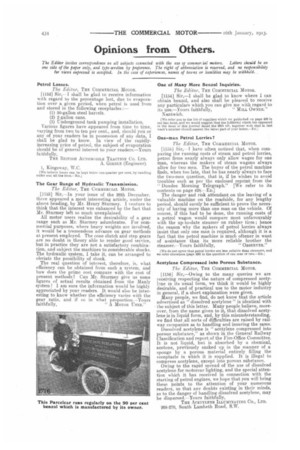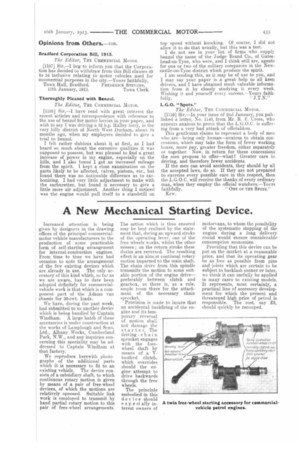Opinions from Others.
Page 16

Page 17

If you've noticed an error in this article please click here to report it so we can fix it.
The Editor invites correspondence on all subjects connected with the use of comrner,ial motors. Letters should be on one side of the paper only, and type-wraten by preference. The right of abbreviation is reserved, and no responsibility for views expressed is accepted. In the case of experiences, names of towns or localities may be withheld. .
Petrol Losses.
The Editor, TEE COMMERCIAL MOTOR.
[1152] Sir,—I shall be glad to receive information with regard to the percentage lost, due to evaporation over a given period, when petrol is used from and stored in the following receptacles : — (1) 50-gallon steel barrels, (2) 2-gallon cans.
(a) Underground tank pumping installation. Various figures have appeared from time to time, varying from two to ten per cent., and, should you or any of your readers be in possession of any data, I shall be glad to know. In view of the rapidlyincreasing price of petrol, the subject of evaporation should be of general interest to your readers.—Yours faithfully, TEE BRITISH AUTOMOBILE TRACTION CO. LTD.
A. GIRDLE (Engineer). 1, Kingsway,
[We believe losses can be kept below one-quarter per cent, by handling under seal all the time.-En.]
The Gear Range of Hydraulic Transmission.
The Editor, THE COMMERCIAL MOTOR.
[1153] Sir,—In your issue of the 26th December, there appeared a most interesting article, under the above heading, by Mr. Henry Sturmey. I venture to think that the interest was enhanced by the fact that Mr. Sturmey left so much unexplained. All motor users realize the desirability of a gear range such as Mr. Sturrney .adumbrates. For commercial purposes, where heavy weights are involved, it would be a tremendous advance on gear methods at present employed_ The cone clutch and step gears are no doubt in theory able to render good service, but in practice they are not a satisfactory combination, and subject the machines to considerable shocks. The hydraulic system, I take it can be arranged to obviate the possibility of shock. The real question of interest, therefore, is. what efficiency can be obtained from such a system, and how does the prime cost compare with the cost of present methods? Can Mr. Sturmey give us some figures of actual results obtained from the Manly system? I am sure the information would be highly appreciated by your readers. It would also be interesting to know whether the efficiency varies with the gear ratio, and if so in what proportion.—Yours
faithfully, " A MOTOR USER!'
One of Many More Benzol Inquiries.
The Editor, THE COMMERCIAL MOTOR. [1154] Sir,—I shall be glad to know where 1 can obtain benzol, and also shall be pleased to receive any particulars which you can give me with regard to its use.—Yours faithfully, " MILL OWNER." Nan twich.
[We refer you to the list of suppliers which we publiihed in page 408 in our last issue, and we would suggest that the Editorial which has appeared in the issue of this journal dated the 24th ult. together w.th that in last week's number should answer the latter part of your letter.-En.;
One-man Petrol Lorries?
The Editor, THE COMMERCIAL MOTOR.
[11551 Sir,--I have often noticed that, when comparing the running costs of steam and petrol lorries, petrol firms nearly always only allow wages for one man, whereas the makers of steam wagons always allow for two men. The buyer of the petrol machine finds, when too late, that he has nearly always to face the two-men question, that is, if he wishes to avoid troubles such as per the enclosed reprint from the " Dundee Morning Telegraph." [We refer to its contents on page 428.—En.] The danger and risk attendant on the leaving of a valuable machine on the roadside, for any lengthy period, should surely be sufficient to prove the necessity of having more than one man on the vehicle. Of course, if this had to be done, the running costs of a petrol wagon would compare most unfavourably with the up-teedate steamer on rubber tires ; hence the reason why the makers of petrol lorries always insist that only one man is required, although it is a fact that the petrol machine is much oftener in want of assistance than its more reliable brother the steamer.Yours faithfully, " OBSERVER."
[We do not agree that petrol lorries are less reliable than steamers, and we refer elsewhere (page 4201 to the question of one MEM or two.-En.i
Acetylene Compressed into Porous Substance.
The Editor, THE COMMERCIAL MOTOR.
[1156] Sir,—Owing to the many queries we are receiving respecting the nature of compressed acetylene in its usual form, we think it would be highly desirable, and of practical use to the motor industry in general, if a short explanation were given. Many people, we find, do not know that the article advertised as "dissolved acetylene " is identical with the subject of this letter. Many people believe, moreover. from the name given to it, that dissolved acetylene is in liquid form, and, by this misunderstanding, we find that all sorts of difficulties are raised by railway companies as to handling and insuring the same. Dissolved acetylene is "acetylene compressed into porous substance," as shown in the General Railway Classification and report of the Fire-Office Committee. It is not liquid, but is absorbed by a chemical, acetone, previously sucked up in the manner of a sponge by a porous material entirely filling the receptacle in which it is supplied. It is illegal to compress acetylene, except into porous substance. Owing to the rapid spread of the use of dissolved acetylene for motorcar lighting, and the special attention which it has received in connection with the starting of petrol engines, we hope that you will bring these points to the attention of your numerous readers, so that any doubts existing in their minds, as to the danger of handling dissolved acetylene, may be dispersed.—Yours faithfully, 268-270, South Lambeth Road, S.W. Bradford Corporation Bill, 1913.
The Editor, THE COMMERCIAL MOTOR.
[1157] Sir,—I beg to inform you that the Corporation has decided to withdraw from this Bill clauses 49 to 54 inclusive relating to motor vehicles used for commercial purposes in the city.—Yours faithfully, Town Hall, Bradford. FREDERICK STEVENS, 11th January, 1913. Town Clerk.
Thoroughly Pleased with Benzol.
The EcTito.r, THE COMMERCIAL MOTOR.
[1158] Sir,—I have read with great interest the recent articles and correspondence with reference to the use of benzol for motor lorries in your paper, and wish to say I was driving a 32 lap. Halley lorry, in the very hilly district of North West Durham, about lb months ago, when My employers decided to give a trial to benzol.
I felt rather dubious about it at first, as I had heard so much about the corrosive qualities it was supposed to possess, but was pleased to find a great increase of power in my engine, especially on the hills, and I also found I got an increased mileage from the spirit. I kept a close examination on the parts likely to be affected, valves, pistons, etc., but found there was no noticeable difference as to carbonizing. I had very little adjustment to make with the carburetter, but found it necessary to give a little more air adjustment. Another thing I noticed was the engine would pull itself to a standstill on top speed without kuocking. Of course, I did not allow it to do that usually, but this was a test. I do not see in your list of firms who ;supply benzol the name of the Judge Brand Co., of Gateshead-on-Tyne, who were, and I think still are, agents for one or two of the colliery companies in the Newcastle-on-Tyne district which produce the spirit.
I am sending this, as it may be of use to you, and I may say your paper is a great help to all keen drivers, and I have obtained much valuable information from it by cloaely studying it every week. Wishing it. and yourself el-my success.—Yours faithfully, L.G.O. "Spots."
The Editor, THE COMMERCIAL MOTOR.
[1159] Sir,—In your issue of 2nd January, you published a letter, No. 1140, from Mr. R. E. Cross, who appears anxious to prove that the L.G.O.C. is suffering from a very bad attack of officialdom. This gentleman claims to represent a body of men who are—being only human—anxious to obtain concessions, which may take the form of fewer working hours, more pay, greater freedom, either separately or together. Now, in return for these concessions the men propose to offer—what? Greater care in driving, and therefore fewer accidents.
If the inert can avoid accidents, they should by all the accepted laws, do so. If they are not prepared to exercise every possible care in this respect, then the L.G.O.C. will receive the thanks of every ordinary man, when they employ the official watchers.—Yours
faithfully, " ONE OF THE SParsa"
Kew.






















